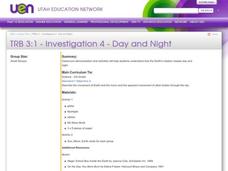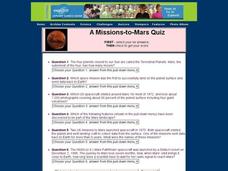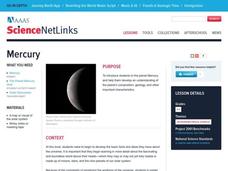Curated OER
Day and Night
Third graders view a classroom simulation that demonstrates how the Earth's rotation creates day and night.
Curated OER
A Mission-To-Mars Quiz
In this space exploration worksheet, students complete a 6 question multiple choice on-line interactive exercise about the exploration of Mars.
Curated OER
Windows to the Universe Scavenger Hunt
Students access the Internet to go on a scavenger hunt to investigate the solar system. For this space mission lessons students fill out a worksheet and explain how technology and scientific inquiry have helped us learn about...
Curated OER
Mercury
Middle schoolers study the planet Mercury and develop an understanding of the planet's composition, geology, and other important characteristics. They explore a Web resource on the planet Mercury which is the central focus of this lesson...
Curated OER
Meteorites
Students model how meteors fall to the surface of planets. In this space science lesson, students identify different types of meteorites using an interactive online website. They investigate the relationship between a meteorite's size...
Curated OER
Solar System
In this online interactive Solar System worksheet, students access a specific website to locate the multiple choice answers to 4 questions dealing with the Solar System. Students answer 3 short answer questions and draw a line connecting...
Curated OER
Our Solar System to Scale
Students calculate the diameter of planets and their relative distances. In this space science lesson, students discover how small or big the planets are in comparison to each other. Students use cross multiplying fractions to find...
Curated OER
Planet Earth
In this Earth activity, students review the characteristics of the Earth including it's rotation and revolution. This activity has 9 fill in the blank and 7 short answer questions.
Curated OER
The Earth, Sun Mood and Stars Unit (Planets too!)
Fifth graders prepare five activities to do then show their energy saving skills. In this investigative lesson plan students create five projects then participate in an energy saving demonstration.
Curated OER
Does the Distance Between the Earth and Sun Cause the seasons?
Students reflect upon the concepts of seasons. The concepts are taught using a variety of different teaching approaches. A activities lead to a reflection that will help students to make a cognitive transfer of information form...
Curated OER
Parts of the Universe
In this universe worksheet, students will complete a graphic organizer by writing in the different parts of the universe, including a brief description of each of these parts.
Curated OER
Cosmic Survey
In this cosmic survey activity, students rank the given cosmic items by size, distance from Earth, and age and complete 3 graphic organizers. Then students complete 5 short answer questions.
American Museum of Natural History
Solar System Scavenger Hunt
Scholars go on a hunt to locate objects that best fit the measurements to create an eye-catching scale model of the solar system.
American Museum of Natural History
What is Astronomy?
Go study the universe. Pupils learn seven aspects about astronomy and astronomers. They begin to learn about constellations; distance and motion between objects; gravity; the electromagnetic spectrum; dark matter and energy; and teams of...
Voyage Solar System
Round and Round We Go — Exploring Orbits in the Solar System
Math and science come together in this cross-curricular astronomy lesson plan on planetary motion. Starting off with a hands-on activity that engages the class in exploring the geometry of circles and ellipses, this lesson...
American Museum of Natural History
Journey to the Stars
Fifteen detailed pictures and informative captions delve deep into the exploration of stars—their life cycle and importance in the universe.
Laboratory for Atmospheric and Space Physics
Looking to the Future
New Horizons set forth on a mission to Pluto in 2006. Ten years later, the spacecraft is still on its way. Here, enthusiastic scholars predict what they will be like—likes, dislikes, hobbies, etc.—when New Horizons arrives at its...
American Museum of Natural History
Make a Terrarium
Scholars read a brief overview of what a terrarium is and how it creates the greenhouse effect, then click on a link to discover the materials and 10 steps they need to build their own.
NOAA
The Great, Glowing Orb What You Will Do: Make a Solar Heat Engine
How is solar energy able to move wind and water to control the climate? Scholars explore the concept of solar energy in the first of 10 activities in the Discover Your Changing World series. They follow instructions to build homemade...
Space Awareness
Oceans as a Heat Reservoir
Oceans absorb half of the carbon dioxide and 80 percent of the greenhouse gases released into the atmosphere. Scholars learn how and why the oceans store heat more effectively than land and how they help mitigate global warming. Pupils...
Starry Night Education
The Stars
Three astronomy activities in one resource! Here you will find one hands-on activity, one demonstration, both with discussion questions, and one activity worksheet. During these lessons young scientists discuss how stars are...
Star Date
Solar System Scale Model Demonstration
Explore outer space and decorate your classroom with an astronomy project. Learners create a visual model with the creation of a scaled solar system using different sized balls.
Space Awareness
Climate Zones
The climate at the equator is hotter than the climate at the poles, but why? The instructional activity goes in depth, explaining how the angles of illumination relate to the heating rate at different latitudes and seasons. Scholars use...
Research Parent
Solar System Cards
Find all things solar system in a set of reference cards. Even Pluto makes an appearance! Each of the 24 cards has a picture and accompanying informational text that gives brief background about the object.
Other popular searches
- Sun and Planets Wordsearch
- Sun and Planets Word Search
- The Sun and Its Planets
- Sun and Planets Pictures
- Planets Distance From Sun
- Why Do Planets Orbit the Sun























